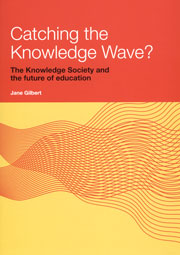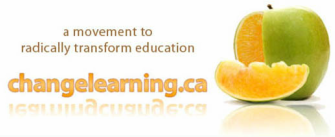
Jane Gilbert says that knowledge is now a verb, not a noun – something we do rather than something we have – and explores the ways our schools need to change to prepare people to participate in the knowledge-based societies of the future.
Read our staff review of Catching the Knowledge Wave?, below. About the author Jane Gilbert is a chief researcher with the New Zealand Council for Educational Research. She has a background in teaching at both secondary and tertiary levels. Related items To view or purchase her book, Catching the Knowledge Wave? ,visit the New Zealand Council for Educational Research website. Read a related article by Jane Gilbert. Staff Review: BOOK REVIEW: Catching the Knowledge Wave? The Knowledge Society and the Future of Education By Jane Gilbert Reviewer: Carrie Ann Taylor New Zealand educator, Jane Gilbert, has a lot to say about the role of public education in contemporary society. She worked as a secondary school teacher, then a university professor and she is now an educational researcher. This is nice, because she brings together two things for educators in this book: a complete comfort and competence with exploring and critiquing various theories of education, as well as an understanding that her ideas, to make a difference in schools, must translate into concrete, identifiable and do-able changes on a concrete, day-to-day level in classrooms and between teachers and students. The basic goal of Gilbert’s book is to examine the how society is changing as we move from the industrial age to the era of the ‘knowledge society’ (also know as the ‘information age’) and then explore what this means for educators in terms of envisioning and creating schools that prepare students to survive and thrive in both the present and the future. Gilbert argues that we are in the midst of a major social and intellectual revolution, saying, “Something very important is happening here, something that we need to take notice of and respond to, and something that we cannot understand from within our usual frames of reference1”. This book is, above all, a book of ideas. Gilbert insists that in order to respond to the changes happening around us, we have some serious intellectual work to do. She writes: “We need to think in new ways, but before we can do this, we need to dig down below the surface of our old ways of thinking – to see how they work, and how they could be different….[this is] and important opportunity to rethink some of what we do in schools – and why we do it2”.
Catching the Knowledge Wave is Gilbert doing just that – examining the underpinning of educational thought up to the present, and then questioning whether these perspectives are sufficient and appropriate in helping us to prepare young people to meet their future.
Gilbert’s book aims to help educators (and anyone who cares about education) think critically and deeply about these issues. Gilbert challenges her readers to radically rethink some of the assumptions that underlie the education systems of the present. But you cannot accuse her of throwing the baby out with the bathwater (or any such hasty dismissal of the status quo). Gilbert also believes that many of the tools, ideas and resources that are required to move forward are “out there already – in schools, in the community, and in the educational literature3”. In this way, even as Gilbert critiques the current system, she honours the fact that many educators are already recognizing and responding to the changes at hand. She explains that her aim in contributing to the debate on the future of education is to help create a “coherent framework for putting these ideas together, one that is underpinned by a clear and generally accepted understanding of what it is we want to achieve4”.
Catching the Knowledge Wave? is grounded in post-modern theory and much of the book concerns itself with ‘deconstructing’ the ideas that the current model of education is based on. Gilbert explores in some details the history of public education (in New Zealand, specifically, but this extrapolates to much of the western world) from its onset in the early industrial age to the present day. However, the key to her argument is in bringing to the reader’s attention the fact that as we move forward into a post-modern world, the very meaning of “knowledge” is changing. We need, Gilbert argues, new ways of thinking about knowledge and learning. Gilbert summarizes this shift as follows:
bq.“What we still need, however, are new metaphors – new non-industrial lenses for looking at the educational landscape. Instead of seeing knowledge as something we have to master, we have to see it as a process, something that happens in particular contexts and relationships. Instead of seeing thinking and learning as individual activities (and working together as cheating), we need to see thinking and learning as things that happen when people get together. Instead of trying to fill people up with all the knowledge they will ever need, we need, we need to build people’s ability to work with others to produce new knowledge that solves authentic real-world problems. Instead of trying to make everyone measure up to preset norms (that are actually only normal for a small percentage of the population), we need to encourage diversity and difference. Instead of trying to make everyone the same, we need a system that helps students move easily between different discourses, and create and perform different identities (some of which may well be ones that no one has thought of before)5”.
Gilbert does not simply present her criticisms; she offers solutions to the problems she sees, and on-the-ground, practical ones at that. What teachers can do now (according to Gilbert): build better links with each other (e.g. cross-discipline projects and modules within schools); more and stronger links to people and organizations within the communities; foregrounding of students real-world research projects; developing their skills for teaching students to work together in small groups; and a focus on helping students understand each discipline (or subject) as a ‘system of thought’ (with its own codes, methods, strengths and limits), rather than focusing on transmitting content. Overall, Gilbert envisions a shift from schools functioning as places where knowledge is consumed, to one where knowledge is produced. And in acknowledging and reinforcing public education’s traditional links with social justice and equality of opportunity, Gilbert reminds us that we must ensure that all students benefit from the changes we are to make in schools.
Even in terms of her suggestions, Gilbert observes that many schools and teachers are already utilizing such strategies. But for Gilbert’s, this is not enough. Her aim is to go beyond band-aids and piecemeal solutions. Gilbert extends a sober warning. We have wonderful pockets of innovation, she notes, but if we focus on these things too soon, we may be putting the cart before the horse. Catching the Knowledge Wave? is a book that makes the case for a profound change on a conceptual level. For Gilbert insists, in the last line of her book: “Only when developments to our education system are underpinned by new mental models, will we be successful in moving our schools into the knowledge age6” .
|
Education should not just prepare students to do things, but to decide what is worth doing. Featured VideoPrograms at Work |
- Jane Gilbert, Catching the Knowledge Wave? The Knowledge Society and the Future of Education, New Zealand Council for Educational Research, 2005, p 9.
- Gilbert, 9.
- Gilbert, 16.
- Gilbert, 16.
- Gilbert, 190.
- Gilbert, 214.



